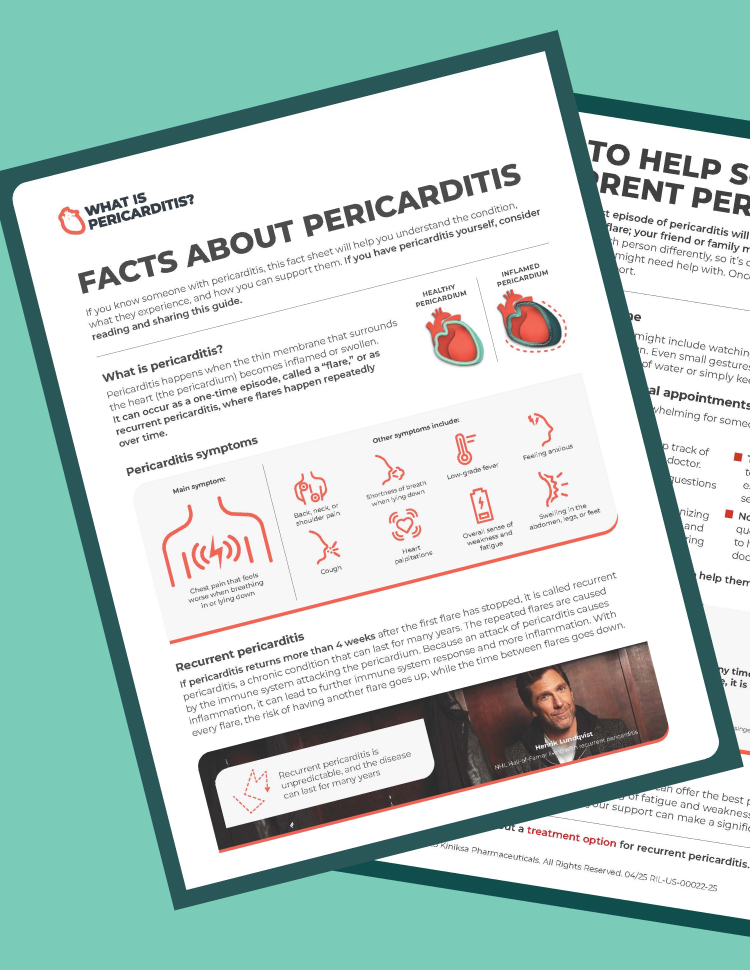
Joao, a medical student living with recurrent pericarditis
The impact of recurrent pericarditis
Up to 1 in 3 people
with a first episode of pericarditis will experience recurrent pericarditis within 18 months of their first flare.

There are approximately 40,000 people
with recurrent pericarditis in the United States who seek care annually.

There are an estimated 20,000
new cases of recurrent pericarditis in the United States each year.

Recurrent pericarditis can impact anyone, including men, women, age groups, racial groups, and economic levels.
Quote from Carly Pearce
"As a performer, I'm afraid sometimes to get on the airplane, or I'm afraid to get on the bus, or I'm afraid to get on the stage because what if a flare happens. And I don't want to live in fear, and I'm living in fear."
How long does pericarditis last?
Recurrent pericarditis can last for many years. In a study of people with recurrent pericarditis,* researchers found that the disease could last (on average) about:
2 or more recurrences
*In this study, 569 people had 1 recurrence and 375 had 2 or more recurrences.
Impact of recurrent pericarditis
These results from a Kiniksa survey conducted by The Harris Poll of 125 people living with recurrent pericarditis showed that the disease had a significant impact on their lives.
This survey was conducted online within the United States by The Harris Poll on behalf of Kiniksa Pharmaceuticals from May 4 to June 1, 2023, among 125 adults aged 18+ who have been diagnosed with recurrent pericarditis and are not currently pregnant or breastfeeding and have never used/are not currently using an IL-1 antagonist. The sampling precision of Harris online polls is measured by using a Bayesian credible interval. For this study, the sample data are accurate to within ±8.7 percentage points using a 95% confidence level.
Recurrent pericarditis was shown to affect:
Physical and mental health

Sleep quality

Work productivity

In a study published in the American Journal of Cardiology, researchers surveyed 83 adults with recurrent pericarditis to understand how the disease was affecting their lives.
In a Harris Poll survey of 125 people living with recurrent pericarditis, 86% of them said they worry they could have a flare at any time.
Quote from Jill
"I couldn’t talk, I couldn’t swallow, I couldn’t walk to the bathroom without being short of breath. I couldn’t climb stairs in my house. I couldn’t do anything. I couldn’t sleep."

Jill | High school superintendent living with recurrent pericarditis
Help others understand what you are going through
Some symptoms of recurrent pericarditis may not be as visible, so family, friends, coworkers, and employers may not understand how debilitating this condition can be. Here are some steps you can take to help them understand:
Point out that some symptoms may not be visible but can still be very challenging, such as extreme fatigue or emotional concerns.

Explain that you might need to rest even when doing things as simple as getting a glass of water or getting dressed.

If your healthcare provider recommends keeping your heart rate below 100 beats per minute, let others know that you may need to avoid social events or other activities to reduce the risk of a flare.

Ask them to learn more about your condition. Direct them to informational websites (such as this site) to help them understand the impact of living with this disease.


Quote from Henrik Lundqvist
Not being able to live your life the way you want to is hard physically and mentally. But with the support of my care team, I found my path forward to come back with more strength.
Last updated: 04/30/25
The content on this page has been written and approved by Kiniksa Pharmaceuticals.
